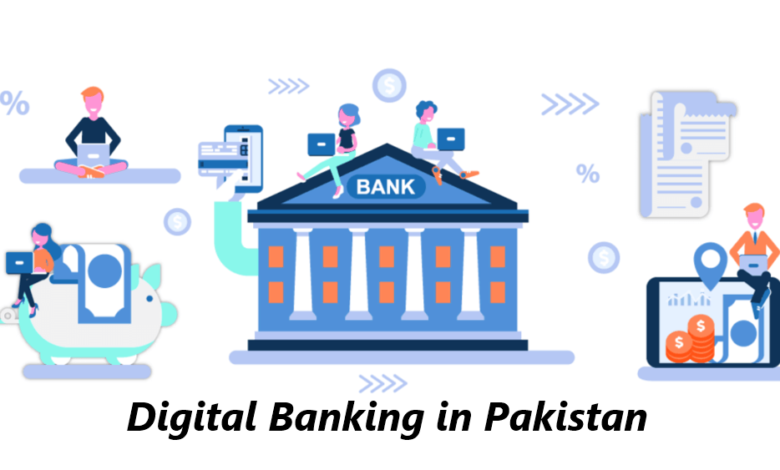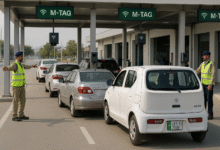The Future of Digital Banking in Pakistan 2023

Digital banking has revolutionized the way financial transactions are conducted, making it more convenient and accessible for people around the world. In Pakistan, the future of digital banking holds tremendous potential for growth and development. This article explores the current state of digital banking in Pakistan, the advancements in technology that are shaping its future, and the impact it will have on the economy.
Digital banking refers to the use of digital technologies to provide banking services to customers. It encompasses various channels such as mobile banking, internet banking, and digital wallets, which enable users to perform financial transactions and access banking services from the comfort of their homes or on the go. With the rapid advancements in technology, the future of digital banking in Pakistan looks promising.
Read More: State Bank orders authorized dealers to expeditiously assist IT and ITeS exporters
The current state of digital banking in Pakistan
Pakistan has witnessed significant growth in digital banking in recent years. Many banks now offer mobile banking apps and Internet banking platforms to their customers, allowing them to conduct a wide range of banking activities remotely. These include checking account balances, transferring funds, paying bills, and even applying for loans.
However, despite the progress made, there is still a large portion of the population that remains unbanked. According to the World Bank, only around 21% of adults in Pakistan have access to a bank account. This presents a significant opportunity for digital banking to bridge the financial inclusion gap and bring more people into the formal banking system.
Advancements in digital banking technology
Mobile banking
Mobile banking has become increasingly popular in Pakistan, with a large number of people using smartphones. Mobile banking apps allow users to perform various banking activities on their phones, such as checking account balances, transferring funds, and making payments. The convenience and accessibility offered by mobile banking have contributed to its rapid adoption.
Internet banking
Internet banking has been a game-changer in the banking industry. Customers can access their bank accounts and perform transactions through secure websites. Internet banking offers a wide range of services, including bill payments, fund transfers, and account management. It has made banking more convenient and efficient for customers, reducing the need to visit physical bank branches.
Digital wallets
Digital wallets have gained popularity in Pakistan, enabling users to store their payment information securely on their smartphones. These wallets allow users to make payments at various online and offline merchants, eliminating the need for physical cash or cards. The ease of use and enhanced security features have made digital wallets a preferred choice for many consumers.
Biometric authentication
Biometric authentication, such as fingerprint and facial recognition, has become an integral part of digital banking. It provides an additional layer of security by verifying the user’s identity using their unique biological features. Biometric authentication methods are being increasingly adopted by banks in Pakistan to ensure secure and convenient access to digital banking services.
Impact of digital banking on the Economy
Digital banking has the potential to have a significant impact on the economy of Pakistan. Let’s explore some of the key areas where digital banking can bring about positive changes:
Financial inclusion
One of the major advantages of digital banking is its ability to promote financial inclusion. By providing access to banking services through digital channels, individuals who previously had limited or no access to traditional banking can now participate in the formal financial system. This helps in reducing the financial gap and empowering underserved communities to manage their finances more effectively.
Cost efficiency
Digital banking offers cost advantages to both banks and customers. For banks, it reduces the need for physical infrastructure and manpower, resulting in lower operational costs. This cost efficiency can be passed on to customers in the form of reduced fees. Digital transactions are also more cost-effective compared to traditional methods, such as paper-based checks, resulting in overall savings for both banks and customers.
Improved customer experience
Digital banking provides customers with a seamless and convenient banking experience. They can perform transactions at any time, from anywhere, using their preferred digital device. This eliminates the need to visit bank branches and wait in long queues. With features like real-time notifications and personalized offers, digital banking enhances the overall customer experience and satisfaction.
Challenges and opportunities in digital banking

While the future of digital banking in Pakistan looks promising, several challenges need to be addressed. Let’s examine some of the challenges and opportunities in this space:
Security and privacy concerns
As digital banking relies on technology and data, security and privacy are of utmost importance. Cybersecurity threats, such as hacking and identity theft, pose risks to both banks and customers. Banks must invest in robust security measures and educate customers about safe online banking practices. Additionally, regulations and policies need to be in place to safeguard customer data and privacy.
Regulatory framework
The digital banking landscape is evolving rapidly, and regulatory bodies need to keep pace with the changing dynamics. Clear and comprehensive regulations are required to govern digital banking operations, protect consumer interests, and ensure a level playing field for all participants. An enabling regulatory environment will foster innovation and promote healthy competition in the industry.
Competition from fintech companies
Fintech companies, with their innovative and agile approach, are disrupting the traditional banking sector. They offer a range of digital financial services, often targeting specific customer segments. Traditional banks need to embrace collaboration and partnerships with fintech companies to stay competitive and deliver innovative solutions to their customers. This collaboration can lead to the development of new products and services that cater to changing customer preferences.
Future trends in digital banking

The future of digital banking in Pakistan is expected to be shaped by several emerging technologies and trends. Let’s explore some of them:
Artificial intelligence and machine learning
Artificial intelligence (AI) and machine learning (ML) have the potential to transform digital banking. AI-powered chatbots can provide personalized assistance to customers, helping them with queries and guiding them through banking processes. ML algorithms can analyze customer data to offer customized financial advice and recommendations. These technologies can also be utilized for fraud detection and prevention, enhancing security in digital transactions.
Blockchain technology
Blockchain technology offers secure and transparent transactions, making it suitable for various banking applications. In Pakistan, blockchain has the potential to streamline processes such as cross-border remittances and supply chain finance. It can also enable faster and more secure identity verification, reducing the risk of fraud. The adoption of blockchain in digital banking can bring about greater efficiency, transparency, and trust in financial transactions.
Personalized banking experiences
As customers become more digitally savvy, they expect personalized experiences from their banks. Digital banking platforms can leverage customer data to offer tailored products and services based on individual preferences and needs. Personalized recommendations, targeted marketing campaigns, and customized financial planning tools can enhance customer engagement and satisfaction. By leveraging data analytics and artificial intelligence, banks can gain insights into customer behavior and preferences, allowing them to deliver highly personalized and relevant experiences.
Benefits for consumers
The future of digital banking in Pakistan brings numerous benefits for consumers. Let’s explore some of the advantages they can expect:
Convenience and accessibility
Digital banking provides unparalleled convenience and accessibility to consumers. With 24/7 access to banking services through mobile apps and Internet platforms, customers can perform transactions and manage their finances at their convenience, without the need to visit a physical branch. This flexibility allows individuals to save time and effort, making banking more convenient than ever before.
Enhanced financial management
Digital banking tools offer a range of features that empower consumers to better manage their finances. Through real-time transaction notifications, spending categorization, and budgeting tools, customers can gain a clear understanding of their financial health. They can track their expenses, set financial goals, and make informed decisions to improve their financial well-being.
Customized services
Digital banking platforms can deliver personalized services tailored to individual customer needs. Banks can analyze customer data to understand their preferences and offer customized product recommendations, such as loan options, investment opportunities, or insurance plans. This level of personalization enhances the customer experience and ensures that customers receive the most relevant and beneficial services.
Collaboration between traditional banks and fintech companies
The future of digital banking in Pakistan will witness a growing collaboration between traditional banks and fintech companies. Traditional banks bring their expertise in banking operations, regulatory compliance, and customer trust, while fintech companies contribute with their innovative technologies and customer-centric approach. This collaboration can result in the development of hybrid banking models, where traditional banks leverage fintech solutions to offer enhanced digital services and cater to evolving customer demands.
Role of the Government and regulatory bodies
The government and regulatory bodies play a crucial role in shaping the future of digital banking in Pakistan. They need to establish clear and comprehensive regulations that ensure consumer protection, cybersecurity, and fair competition. Additionally, the government can drive financial inclusion initiatives by encouraging partnerships between banks and fintech companies, promoting digital literacy, and creating an enabling environment for innovation and investment in the digital banking sector.
Read More: Launched by Bank Alfalah, Tap on Phone Simplifies Commerce
Conclusion
The future of digital banking in Pakistan holds tremendous potential for growth and innovation. With advancements in technology, increased smartphone penetration, and changing customer preferences, digital banking is set to transform the way financial services are delivered and consumed. The benefits of convenience, accessibility, and personalized experiences will empower individuals, drive financial inclusion, and contribute to the overall economic development of the country.
FAQ
Is digital banking safe and secure?
Yes, digital banking employs various security measures, such as encryption, multi-factor authentication, and secure protocols, to ensure the safety and confidentiality of customer information and transactions.
Can I access digital banking services outside of Pakistan?
Depending on your bank and its policies, you may be able to access digital banking services outside of Pakistan. It is advisable to check with your bank regarding their international banking capabilities and any associated fees or restrictions.
How can I protect my digital banking account from unauthorized access?
To protect your digital banking account, it is important to use strong and unique passwords, enable two-factor authentication, keep your devices and software updated, and avoid sharing sensitive information or clicking on suspicious links.
What should I do if I encounter an issue or need assistance with digital banking?
If you encounter any issues or need assistance with digital banking, you can reach out to your bank’s customer support through their designated channels, such as phone, email, or live chat. They will be able to provide guidance and support to resolve any concerns.
What are the advantages of digital banking over traditional banking?
Digital banking offers advantages such as convenience, 24/7 accessibility, faster transactions, lower costs, personalized services, and the ability to track and manage finances in real time. It eliminates the need for physical visits to bank branches and provides a seamless banking experience.












One Comment